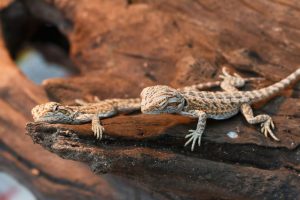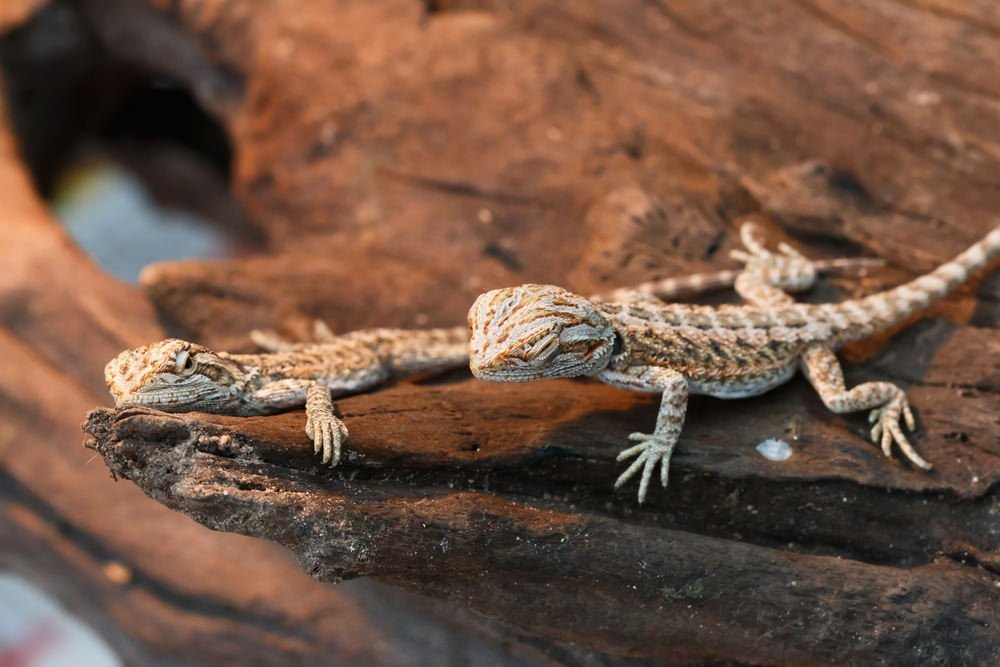Baby Bearded Dragon
Free Pet Insurance Comparison
Compare Quotes From Top Companies and Save
Secured with SHA-256 Encryption
Dr. Pippa Elliott BVMS, MRCVS
Veterinarian
Dr Pippa Elliott BVMS, MRCVS is a veterinarian with over 30 years of experience in companion animal practice. In 1987 she graduated from the University of Glasgow, with a degree in veterinary medicine and surgery. She works at Blythwood Vets and the People’s Dispensary for Sick Animals (PDSA). Pippa is an advocate of Fear-Free Practice, an animal addict, and a veterinary writer. She is also w...
Veterinarian
UPDATED: Dec 16, 2023
Pet Insurance U receives compensation from the third parties included on this site. This includes payment for clicks from our site to insurance providers’ sites and quote requests generated. Our rankings and reviews are not affected by payments from the insurance companies. The compensation we receive allows the site to be free and regularly updated. Our goal is to review every pet insurance provider, but not all companies are listed on the site.
And many of the companies we review do not pay us anything. We simply rate, compare and review their plan because we feel it will be valuable to you. Our reviews are guaranteed to be unbiased, professional and advertising compensation does not influence rankings.
We are a free online resource for anyone interested in learning more about pet insurance. Our goal is to be an objective, third-party resource for everything pet insurance related. We update our site regularly, and all content is reviewed by pet insurance experts.
UPDATED: Dec 16, 2023
Pet Insurance U receives compensation from the third parties included on this site. This includes payment for clicks from our site to insurance providers’ sites and quote requests generated. Our rankings and reviews are not affected by payments from the insurance companies. The compensation we receive allows the site to be free and regularly updated. Our goal is to review every pet insurance provider, but not all companies are listed on the site.
And many of the companies we review do not pay us anything. We simply rate, compare and review their plan because we feel it will be valuable to you. Our reviews are guaranteed to be unbiased, professional and advertising compensation does not influence rankings.
On This Page
Baby bearded dragons have become a popular pet in many households.
These little creatures are not only cute but have a big personality.
In fact, caring for a Baby Bearded dragon is very similar to that of a cat and dog, especially in their infancy.
Table of Contents:
Where To Find A Baby Bearded Dragon

Bearded dragons are commonly available at stores, reptile expos, and breeders’ websites.
Captive-bred specimens are highly recommended because they are usually healthier and more acclimated to captivity than wild-caught animals.
They come in various colors.
Enter your ZIP code below to view companies that have cheap pet insurance rates.
Secured with SHA-256 Encryption
Ideal Habitat For A Baby Bearded Dragon
Most people assume the habitat for a baby bearded dragon is identical to a snake, but that’s not always the case.
When it comes to baby bearded dragons, it is best to keep the young ones in smaller enclosures.
A ten-gallon enclosure is great for the first few months of a baby bearded dragons’ live.
At four to five months, it is best to separate dragons appropriately.
While some can get along much longer, they can start being more territorial at this age as they develop.
You can pair females together for longer, especially if they had already shared space previously.
If you don’t want to go through different enclosures, you could start your baby in a full-size enclosure, but the small enclosure eliminates stress for the young dragons.
When they don’t have to run all over a big enclosure, they seem to get to their food easier and the temperature is much easier to maintain in the stricter parameters necessary.
When it comes to adult bearded dragons, a 75-gallon aquarium or equal-sized enclosure is OK for one or two adult dragons.
Screening should be used for proper ventilation, whether as a top on an aquarium enclosure or in the construction of a custom enclosure.
During warm weather, bearded dragons can be kept in outdoor cages.
Be sure the outdoor enclosure provides both sunny basking areas and shady retreats, as well as shelter from the rain.
Having access to the sun outdoors provides healthy UV.
Bearded dragons like to climb, so some sturdy branches are welcome in their enclosures.
Do Not Use Sand in Your Bearded Dragon Enclosure
Sand which is typically used for other reptiles can cause impaction in your dragon and lead to his or her demise.
As your dragon eats, there is always a chance of them catching a mouthful of sand.
Impaction is basically the buildup of something hard to digest such as sand in the dragon’s stomach then intestines and finally bowel system which leads to an inability to pass waste which can ultimately end up killing a dragon.
Instead try using the reptile carpets, newspaper, paper towels or something similar to minimize the risk of unwanted soils being digested.
You can even use cut up old towels or rags or anything else that is almost impossible to digest.
Need Pet Insurance?
FACT: Pet insurance pays up to 90% of vet bills when your pet is sick or injured!
Baby Bearded Dragon Care
When picking up a baby bearded dragon, especially at very young ages, try and scoop them into a palm.
Oftentimes you can coerce them into your palm and they will climb in when they feel the heat of your hand near them.
Try not to pick up a baby bearded dragons by his or her tail.
This seems like the easiest method but with their tiny size, the strain could be harmful to their bodies.
All baby bearded dragons can be skittish at some point.
Be patient and understand that as a young puppy, it is difficult for your baby to sit still.
As your dragon ages, it will naturally calm down and become more accustomed to being handled.
Bearded Dragon Diet
Bearded Dragons do a lot of growing from their first day to about a year old with the majority of that growth happening while they are still quite young.
Just like a puppy, they need to be fed almost constantly.
Just like humans, baby dragons need to be fed a lot.
Ideally, you want to be able to offer a small feeding of a protein source such as pin-head to baby crickets twice daily and a small portion of greens daily to every other day.
When feeding, prepare your greens and size your food options appropriately.
You never want to feed your bearded dragon anything wider than the distance between its eyes.
Anything larger and you risk feeding your dragon something it may not be able to swallow.
Now is also a good time to get into the habit of giving your live food source a “calcium bath” by shaking the crickets or worms in a bag with a little bit of calcium powder to cover them in a nice light coating.
This will help your dragon grow as well as get them in the habit of eating food covered in the powder.
Enter your ZIP code below to view companies that have cheap pet insurance rates.
Secured with SHA-256 Encryption
Final Thoughts on Caring for a Bearded Dragon
These are merely the basics to take care of your bearded baby dragon, but it should get you on good footing with your new reptilian friend.
Hopefully, this post has given you all the information you need to care for your bearded dragon. Having a pet insurance plan will not only protect your scaly friend, but it will also protect your wallet.

Frequently Asked Questions
Is my personal information secure on this site?
Yes, this site is secured with SHA-256 Encryption, ensuring the protection of your personal information.
Who is Melanie Musson, and why is she qualified to provide insurance information?
Melanie Musson is a published insurance expert with a family background in the insurance industry. She has an in-depth knowledge of state-specific car insurance laws and dynamics, making her qualified to offer insurance information.
Why does the site mention pet insurance and have information on baby bearded dragons?
The site covers various insurance-related topics. While Melanie Musson specializes in car insurance, there is also content on pet insurance, providing valuable information for those interested in caring for pets like baby bearded dragons.
Is the information on this site unbiased?
Yes, the site aims to provide unbiased information. The advertiser disclosure mentions compensation from third parties but emphasizes that rankings and reviews are not influenced by payments. The goal is to be an objective, third-party resource.
How can I find a baby bearded dragon?
Baby bearded dragons are commonly available at stores, reptile expos, and breeders’ websites. It is recommended to choose captive-bred specimens for better health and acclimation to captivity.
What is the ideal habitat for a baby bearded dragon?
For the first few months, a ten-gallon enclosure is suitable. As they grow, separate dragons appropriately to avoid territorial issues. Adult bearded dragons can thrive in a 75-gallon aquarium or equivalent enclosure with proper ventilation.
What substrate should I use in a bearded dragon enclosure?
Avoid using sand, as it can cause impaction in bearded dragons. Instead, use reptile carpets, newspaper, paper towels, or similar materials to minimize the risk of digestion issues.
How should I care for a baby bearded dragon?
Handle them carefully, avoid picking them up by the tail, and be patient with their skittish behavior. Feed them small portions of protein sources like pin-head crickets and offer greens daily to every other day.
What should I know about the bearded dragon diet?
Bearded dragons undergo significant growth in their first year, requiring frequent feeding. Offer protein sources and greens appropriately sized for their age, avoiding anything wider than the distance between their eyes.
Why does the site mention pet insurance in the context of bearded dragon care?
Pet insurance is suggested as a means to protect both the pet and the owner’s wallet. It’s a precautionary measure to handle potential health issues in pets, including bearded dragons.
Enter your ZIP code below to view companies that have cheap pet insurance rates.
Secured with SHA-256 Encryption
Dr. Pippa Elliott BVMS, MRCVS
Veterinarian
Dr Pippa Elliott BVMS, MRCVS is a veterinarian with over 30 years of experience in companion animal practice. In 1987 she graduated from the University of Glasgow, with a degree in veterinary medicine and surgery. She works at Blythwood Vets and the People’s Dispensary for Sick Animals (PDSA). Pippa is an advocate of Fear-Free Practice, an animal addict, and a veterinary writer. She is also w...
Veterinarian
We are a free online resource for anyone interested in learning more about pet insurance. Our goal is to be an objective, third-party resource for everything pet insurance related. We update our site regularly, and all content is reviewed by pet insurance experts.


